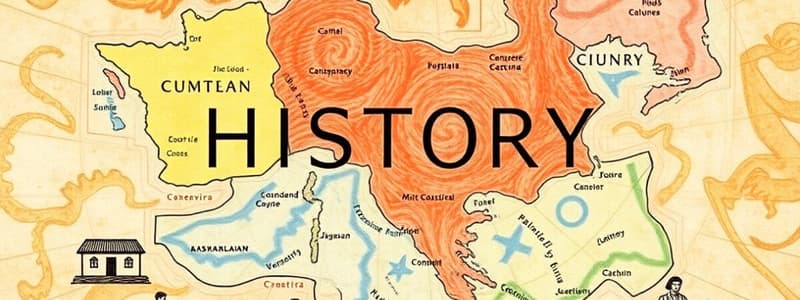Podcast
Questions and Answers
What defines the Prehistoric Era?
What defines the Prehistoric Era?
- Development of sophisticated writing systems
- Time before written records (correct)
- Emergence of advanced political systems
- A period dominated by empires
Which major historical theme involves the evolution of political systems?
Which major historical theme involves the evolution of political systems?
- Politics and Governance (correct)
- Society and Culture
- Economics
- Conflict and War
What was a significant outcome of the Renaissance?
What was a significant outcome of the Renaissance?
- Decline of feudal systems
- Suppression of scientific inquiry
- Cultural revival in art, literature, and science (correct)
- Consolidation of empires
Which empire is associated with the Classical Antiquity era?
Which empire is associated with the Classical Antiquity era?
What does historiography study?
What does historiography study?
Herodotus is often referred to as the 'Father of History' for his work on which event?
Herodotus is often referred to as the 'Father of History' for his work on which event?
What does the theme of colonization and globalization primarily address?
What does the theme of colonization and globalization primarily address?
Which of the following best describes ancient civilizations?
Which of the following best describes ancient civilizations?
Flashcards are hidden until you start studying
Study Notes
Key Concepts in History
-
Definition of History: The study of past events, societies, and civilizations, often based on written records.
-
Importance of History:
- Understanding human behavior and societal development.
- Learning from past mistakes and successes.
- Providing context for current events and trends.
Major Eras in History
-
Prehistoric Era:
- Time before written records.
- Characterized by the development of tools, language, and early societies.
-
Ancient History:
- Includes civilizations such as Mesopotamia, Egypt, India, China, and Greece.
- Development of writing, trade, and governance.
-
Classical Antiquity:
- Rise of empires (e.g., Roman Empire, Persian Empire).
- Important philosophical, scientific, and cultural advancements.
-
Middle Ages:
- Characterized by feudalism, the rise of Christianity, and the spread of Islam.
- Development of trade routes and early universities.
-
Renaissance:
- A cultural revival in art, literature, and science in Europe.
- Emphasis on humanism and exploration.
-
Modern History:
- Marked by revolutions (e.g., Industrial, American, French).
- Growth of nation-states, colonialism, and global interactions.
Key Historical Themes
-
Politics and Governance:
- Evolution of political systems from monarchies to democracies.
- The impact of revolutions and reforms.
-
Economics:
- Development of trade, commerce, and economic systems (capitalism, socialism).
- The role of agriculture in early societies.
-
Society and Culture:
- Influence of religion and ideology on societies.
- Social stratification and movements for rights (civil rights, feminism).
-
Conflict and War:
- Causes and consequences of wars throughout history.
- The impact of technology on warfare.
-
Colonization and Globalization:
- Effects of European colonization on indigenous populations.
- The interconnectedness of the modern world through trade and communication.
Historical Methods
- Primary Sources: Original documents and artifacts from the period being studied (e.g., letters, photographs).
- Secondary Sources: Interpretations and analyses of primary sources by historians.
- Historiography: The study of how history has been written and the perspectives that shape it.
Important Figures in History
- Herodotus: Often called the "Father of History"; known for his work on the Greco-Persian Wars.
- Thucydides: Focused on the Peloponnesian War; emphasized evidence and rational analysis.
- Karl Marx: Developed historical materialism, analyzing history through the lens of class struggle.
- Simone de Beauvoir: Contributed to feminist history and existentialism.
Historical Tools and Techniques
- Chronology: Organizing events in order to understand cause and effect.
- Archaeology: The study of past human activity through material remains.
- Oral History: Collecting and analyzing personal narratives and eyewitness accounts.
Conclusion
- History is a complex interplay of events, ideas, and socio-cultural dynamics that shape human experience.
- Understanding history is essential for informed citizenship and personal development.
Key Concepts in History
- History encompasses the study of past events, societies, and civilizations, primarily relying on written records.
- Understanding history helps in comprehending human behavior, societal evolution, and providing insight into contemporary issues.
- Learning from historical successes and failures can guide future decisions.
Major Eras in History
- Prehistoric Era: A time without written records, noted for advancements in tools, language development, and the formation of early human societies.
- Ancient History: Featured foundational civilizations including Mesopotamia, Egypt, India, China, and Greece; highlighted the emergence of writing, trade, and governance structures.
- Classical Antiquity: Marked by the rise of powerful empires like the Roman and Persian Empires; significant philosophical, scientific, and cultural contributions emerged.
- Middle Ages: Defined by feudalism, the ascendancy of Christianity, and the spread of Islam; initiated the growth of trade routes and the establishment of early universities.
- Renaissance: A cultural revival in Europe focusing on art, literature, science, and humanism; spurred exploration and an appreciation for classical antiquity.
- Modern History: Characterized by transformative revolutions like the Industrial, American, and French; saw the rise of nation-states, colonialism, and increased global interactions.
Key Historical Themes
- Politics and Governance: Illustrates the transition from monarchies to democracies, highlighting the impact of revolutions and political reforms.
- Economics: Chronicles the evolution of trade, economic models like capitalism and socialism, and the fundamental role of agriculture in early societies.
- Society and Culture: Examines the influence of religion and ideology, alongside social hierarchies and movements advocating for civil rights and feminism.
- Conflict and War: Investigates the drivers and consequences of historical conflicts, along with the technological advancements in warfare.
- Colonization and Globalization: Addresses the repercussions of European colonization on indigenous people and the modern world's interconnectedness through trade and communication.
Historical Methods
- Primary Sources: Essential original documents and artifacts, such as letters and photographs, that provide direct insight into past events.
- Secondary Sources: Historians' interpretations and analyses of primary sources that help contextualize historical understanding.
- Historiography: The examination of how history has been recorded, including the diverse perspectives that influence historical narratives.
Important Figures in History
- Herodotus: Regarded as the "Father of History"; documented the Greco-Persian Wars, emphasizing narrative history.
- Thucydides: Focused on the Peloponnesian War, known for his rigorous approach to evidence and analytical reasoning.
- Karl Marx: Introduced historical materialism, framing history through the lens of class struggles and economic forces.
- Simone de Beauvoir: Influenced feminist history and existential thought, advocating for women's rights and societal change.
Historical Tools and Techniques
- Chronology: Organizes historical events to reveal causal relationships and development over time.
- Archaeology: Investigates past human behavior via material remains, providing insights into lost civilizations.
- Oral History: Gathers and analyzes personal accounts from individuals, preserving firsthand experiences of historical events.
Conclusion
- History represents a complex tapestry of events, ideas, and cultural dynamics that define human experiences.
- A comprehensive understanding of history is vital for effective citizenship and personal growth, fostering informed decision-making.
Studying That Suits You
Use AI to generate personalized quizzes and flashcards to suit your learning preferences.




